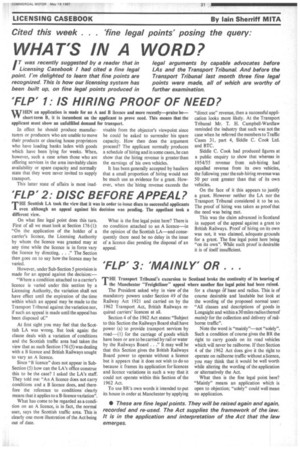'FLP` 1: IS HIRING PROOF OF NEED?
Page 33

If you've noticed an error in this article please click here to report it so we can fix it.
WHEN an application is made for an A and B licence and more recently—praise be— short-term B, it is incumbent on the applicant to prove need. This means that the applicant must show an unfulfilled demand for transport.
In effect he should produce manufacturers or producers who are unable to move their products or clearing house proprietors who have loading banks laden with goods which have been lying for weeks. When, however, such a case arises those who are offering services in the area inevitably claim availability or spare capacity and normally state that they were never invited to supply transport This latter state of affairs is most inad visable from the objector's viewpoint since he could be asked to surrender his spare capacity. How then does the argument proceed? The applicant normally produces a schedule of hiring and in some cases, he can show that the hiring revenue is greater than the earnings of his own vehicles.
It has been generally accepted by hauliers that a small proportion of hiring would not be much use as evidence for a grant. However, when the hiring revenue exceeds the "direct use" revenue, then a successful application looks more likely. At the Transport Tribunal Mr. T. H. Campbell-Wardlaw reminded the industry that such was not the case when he referred the members to Traffic Cases 31, part 4, Siddle C. Cook Ltd. and BTC.
Siddle C. Cook had produced figures at a public enquiry to show that whereas in 1954/55 revenue from sub-hiring had equalled revenue from its own vehicles, the following year the sub-hiring revenue was 50 per cent greater than that of its own vehicles.
On the face of it this appears to justify a grant. However neither the LA nor the Transport Tribunal considered it to be so. The proof of hiring was taken as proof that the need was being met.
This was the claim advanced in Scotland in support of the appeal against a grant to British Railways. Proof of hiring on its own was not, it was claimed, adequate grounds for a grant. The fine legal point here being "on its own". While such proof is desirable it is of itself insufficient.




















































































































